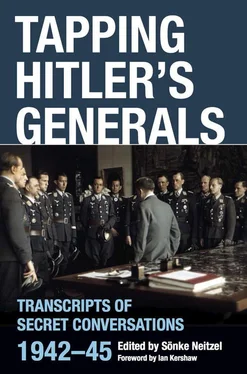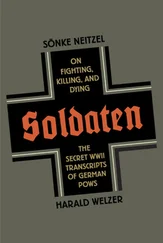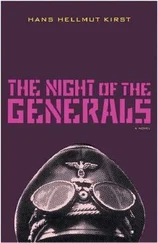The fact that, down to the very end of the Third Reich, such strong divisions between the captured German officers about their attitude towards the Nazi regime, and towards Hitler personally, could be sustained highlight the impossibility at crucial earlier stages, before the war, of building any reliable base of opposition within the Wehrmacht. The isolation of the then Chief of the General Staff, Ludwig Beck, when he resigned during the Sudeten crisis of 1938, or the hesitancy and ambivalence of his successor, Franz Halder as the crisis brewed to its climax in the weeks before the Munich Conference, become all the easier to understand when we see the attitudes represented in this edition of the military elite several years later, and after all that had transpired in the meantime.
It was not just a matter of expressly Nazi opinion among the generals. Nazified officers were, in fact, in a minority at Trent Park, as they surely were generally by this phase of the war. Strong antipathy towards the regime was far more commonplace. But most strikingly prevalent is the evidence of strong German patriotic and Prussian values. These had been a characteristic feature of the officer corps throughout the Third Reich. Though distinct from fully-fledged pro-Nazi views or sympathy with the regime, they overlapped to the extent that they disabled, or at least hindered, moves to direct oppositional action. Reflections of this could still be registered among the prisoners of war in Trent Park. Though, for instance, some expressed regret that Stauffenberg’s attempt on Hitler’s life had failed, others disapproved of the bomb-plot and saw it as irreconcilable with their sense of honour. Another indication was the lingering imprint of the oath taken to Hitler in 1934. And even when the generals in British captivity took the view that Hitler’s subsequent actions had relieved them from their oath, they still felt bound by a sense of Prussian honour to continue the fight. Almost all still took the view that it was an officer’s duty to fight to the last bullet (though few actually adhered in practice to their own prescribed code of ethics in this regard). So they not only for the most part strongly criticised General Paulus for his surrender in Stalingrad, but, even when claiming that it was madness to continue the war, rejected out of hand the notion that commanders on the Western Front should cease fighting and thereby open the way for the advance of the Anglo-Americans. Here, the plain implication was that the fight against the Soviets should not be given up, but would proceed with western help, another idea that had gained ground in leading Nazi circles in the latter part of the war. And the captured officers refused to contemplate taking part in BBC broadcasts or other anti-German propaganda, which they still regarded as treasonable. Even in the regime’s very last days, the generals struggled to reach agreement on a letter they eventually sent to Churchill only after Hitler’s death, offering (of course, in their own interest) to help bring about a ‘renewal’ in Germany ‘in the spirit of western Christianity’.
This edition also makes clear that knowledge of atrocities on the grand scale in Eastern Europe was extensive among Germany’s military elite – even those who found themselves in British captivity long before the end of the war. The transcripts of the bugged conversations include firsthand descriptions of the mass shooting of Jews (and no shortage of Nazified parlance betraying deep anti-Jewish sentiments). They also reveal recognition of the scale of the killing of Jews, and also of Poles, Russians and others. One account, and dating from as early as the end of 1943, indeed reckoned that three to five million Jews had already been wiped out. General von Choltitz, captured at the fall of Paris (where he had presided as city commander), even admitted, something not previously known, that he had systematically carried out orders for the liquidation of Jews in his area (probably the Crimea in 1941–42). For the most part, however, the blame was attached squarely to the Nazi leadership, and above all to the SS. The draft of the letter written to Churchill at the end of April 1945 acknowledged the need for punishment of those guilty of the regime’s crimes – atrocities, it was claimed, committed almost exclusively by the SS, crimes of which only a small portion of the German people were aware, and then merely through rumour. One general, when the draft letter was being discussed, accepted that that it was useful to put it that way and that they were looking for a scapegoat. It shows that the ‘legend of the “unblemished” Wehrmacht’ was also being created by German generals even in captivity, and even before the Third Reich fell.
It is the great merit of Professor Neitzel’s research that it opens up to us these previously untapped rich sources for exploring the mentality of representatives of Germany’s military elite in the phase when the war had turned irredeemably against the Third Reich, and down to the collapse of the Hitler regime. For this excellent edition, we are very much in his debt.
Ian Kershaw, 2007
The secret British transcripts of German prisoners of war have proven to be an extraordinarily rich source of research material on the Wehrmacht. These transcripts were presented to the public for the first time in a comprehensive manner in the German edition, Abgehört (2005). The study appeared initially in German and was then translated into five languages, [a] English: Tapping Hitler’s Generals: Transcripts of Secret Conversations, 1942–1945 , London 2007; Spanish: Los Generales de Hitler , Barcelona 2008; Czech: Odposlechy. Nemecti generàlové v britském vàlecnèm zajeti v letech 1942–1945 , Prague 2009; Slovakian: Opocúvani. Nemecki vysoki dostojnici v britskom väzeni (1942–1945) , Bratislava 2009; Polish: Podsluchiwani. Niemieccy generalowie w brytyjskiej niewoli 1942–1945 , Zakrzewo 2009.
including the English edition, Tapping Hitler’s Generals , which was published in 2007.
In Germany, the book has been received with great interest by both scholars and the broad public, resulting in two hardcover and six paperback editions. The conversations about war crimes, the war of annihilation, and what soldiers knew about the Holocaust aroused particular interest: Spiegel ’ s headline was ‘ Bestien beim Beichten ’ (‘Beasts in the Confessional’), the Bildzeitung described them as ‘ Abhörprotokollen des Grauens ’ (‘secret transcripts of horror’), and in the Welt am Sonntag , the famous German literary critic Fritz Raddatz wrote about ‘ Ansichten einiger Clowns ’ (‘statements of various clowns’) and gave vent to all of his hatred for the generals of the Wehrmacht.
Statements from right-wing extremists represent the other end of the spectrum. The weekly newspaper Junge Freiheit contested the value of the transcripts, claiming that because the recorded discussions were facilitated by stool pigeons, and because the generals must have known without a doubt that they were being bugged, they intentionally gave false information. The original recordings no longer exist, making it impossible to confirm the authenticity of the transcripts, leading Junge Freiheit to claim that these transcripts are nearly worthless as a source. In internet forums, there have even been assertions that the transcripts are forgeries. Timo von Choltitz, the son of Dietrich von Choltitz, one of the generals mentioned in Tapping Hitler’s Generals , even had the Stuttgart state office of criminal investigation analyse the typefaces of the transcripts to confirm his suspicion that they were a fake. The examination of course did not reveal any irregularities – yet he continues to believe that the transcripts are forged.
Читать дальше








![Traudl Junge - Hitler's Last Secretary - A Firsthand Account of Life with Hitler [aka Until the Final Hour]](/books/416681/traudl-junge-hitler-s-last-secretary-a-firsthand-thumb.webp)



